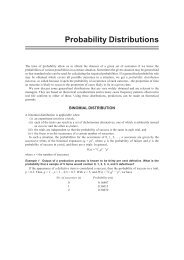International-Business-Dr-R-Chandran-E-book
International-Business-Dr-R-Chandran-E-book
International-Business-Dr-R-Chandran-E-book
Create successful ePaper yourself
Turn your PDF publications into a flip-book with our unique Google optimized e-Paper software.
227<br />
<strong>International</strong> <strong>Business</strong>- <strong>Dr</strong>. R. <strong>Chandran</strong><br />
the least comparative disadvantage in the production of cloth, whose relative<br />
cost (100/90) is less than relative cost of wine (120/80). Thus Portugal<br />
should concentrate more on the production of wine whereas England should<br />
concentrate on cloth, thus benefiting both countries.<br />
Ricardo explained the principle of comparative cost in international trade,<br />
but did not explain the determination of the terms of trade i.e. the rate at<br />
which one commodity will be exchanged for the other. Since the ration of<br />
exchange, say wine for cloth would be the same for both the countries after<br />
they enter into trade, it must be somewhere between domestic exchange<br />
ratios of the two goods within each country. Since wine is costlier in<br />
England than cloth, as it takes more Labour to produce wine than cloth, the<br />
exchange ratio in England would be 1 unit of wine = 120/100 = 1.2 units of<br />
cloth. On the other hand, cloth is costlier in Portugal as it takes more labour<br />
to produce cloth than wine. The exchange ratio would be 1 unit wine =<br />
80/90 = 0.89 units of cloth. So the international rate of exchange of wine for<br />
cloth would thus be settled somewhere between 1 unit of wine = 1.2 units<br />
and 0.89 units of cloth. Assuming that the rate is established at 1 unit of<br />
cloth = 1 unit of wine, England would gain because at home the ratio was<br />
1.2 units of cloth for 1 unit of wine. Portugal would also gain because at<br />
home it could produce only 0.89 units of cloth for 1 unit of wine. Thus, with<br />
international trade both the countries will benefit.<br />
On the same lines Spain produces chicken and Chile produces wine at<br />
lower cost; Australia produces wool made ups and Singapore produces<br />
edible oil at relatively low cost; Malaysia produces rubber products at a low<br />
cost compared to knit wear, which Indonesia produces at a lower cost<br />
compared to rubber. In the latter case both countries are situated close to<br />
each other and hence it would be a distinct advantage for Malaysia to focus<br />
on rubber and supply it to Indonesia and for Indonesia to focus on knit wear<br />
and export it to Malaysia.<br />
An important implication of theory of comparative cost is based on the<br />
principle of complete specialization. According to above example, England<br />
should specialize in the production of cloth and Portugal in the production of<br />
wine. Each country would produce only goods in which it has a comparative<br />
advantage and trade the surplus of production with other countries. The<br />
underlying basis of complete specialization is that the comparative<br />
advantage is permanent, irrespective of the scale of production in both<br />
countries- Ricardo assumes the production is subject to the law of constant<br />
returns i.e. the cost per unit of output would remain the same whatever be<br />
the scale of production. He also assumes that a permanent supply of raw<br />
material and other consumables associated with the product are available,<br />
Only for Private Circulation





